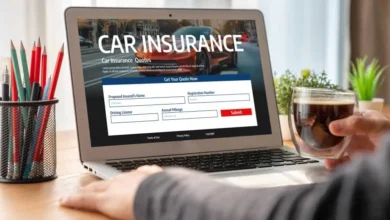Personal Insurance in the United States A Comprehensive Guide for Individuals and Business Owners
Learn about personal insurance options for U.S. citizens, including coverage for entrepreneurs, auto, and umbrella policies. Get expert tips on finding the best insurance deals.

- Conhecimento é poder
- O Futuro do possível
- Hibs e os fãs do Ross County na final
- Dica do dia: Aquele homem de novo
- Hibs e os fãs do Ross County na final
- Atenção perigo de falta de corte
Personal Insurance in the United States A Comprehensive Guide for Individuals and Business Owners. Personal insurance is a crucial part of financial planning for U.S. citizens, offering protection against unexpected events that could otherwise result in substantial financial losses.
Whether you’re an entrepreneur, self-employed, or just seeking to protect yourself and your assets, having the right personal insurance policies is essential.
In this comprehensive guide, we’ll cover the key aspects of personal insurance, including the different types available, tips for finding affordable policies, and considerations for entrepreneurs.
We’ll also dive into state-specific insurance regulations and provide insights into the best insurance companies and agents. This article is optimized for SEO and tailored for U.S. citizens seeking personal insurance advice.
What is Personal Insurance?
Personal insurance provides coverage for individuals and their families against a range of risks, including health issues, car accidents, property damage, and legal liabilities. It typically includes policies like:
- Health insurance
- Auto insurance
- Homeowners or renters insurance
- Life insurance
- Personal liability (umbrella) insurance
Each of these types of insurance protects you from specific financial risks, and your coverage needs may vary depending on your location, profession, and lifestyle.
Personal Insurance for Entrepreneurs
Entrepreneurs and business owners face unique risks that require specialized insurance. If you’re a business owner, you’ll need to consider not just personal insurance but also coverage for your business.
1. Personal Insurance for Entrepreneurs
Entrepreneurs often need more comprehensive personal insurance coverage, as their personal and professional lives are closely intertwined. If you own a small business, here are a few types of personal insurance to consider:
- Health Insurance: While some entrepreneurs rely on their spouse’s health insurance, many need to find individual plans, especially those who are self-employed.
- Personal Auto Insurance: Entrepreneurs who use their car for both business and personal reasons should ensure their policy covers both types of use.
- Disability Insurance: If you’re unable to work due to illness or injury, disability insurance will provide income replacement.
Entrepreneurs should work closely with a personal insurance agent or broker to ensure they have adequate protection for both personal and business risks.
Finding the Best Personal Insurance Quotes
Whether you’re searching for personal insurance for your car, home, or health, getting a good personal insurance quote is essential.
Insurance premiums vary depending on the insurer, your location, and your specific needs. Here’s how to get the best quotes:
1. Compare Quotes Online
Using online comparison tools is one of the easiest ways to find the best personal insurance rates. Websites like The Zebra, Policygenius, and Insure.com allow you to compare quotes from multiple insurers side by side.
2. Work with a Personal Insurance Agent
An personal insurance agent can help you navigate the complexities of insurance policies and find coverage that fits your needs and budget. Independent agents can provide quotes from multiple companies, helping you find the best deal.
3. Consider Bundling Policies
Many insurers offer discounts when you bundle multiple policies, such as home and auto insurance. Bundling can significantly reduce your premium and simplify your insurance management.
Personal Auto Insurance
Auto insurance is one of the most common types of personal insurance in the United States. Most states require drivers to carry personal car insurance to protect against liability and damages in the event of an accident.
1. Mandatory Coverage by State
Each state has its own minimum requirements for car insurance. For example:
- Liability insurance is required in nearly all states, covering injuries or damages you cause to others in an accident.
- Personal injury protection (PIP) is mandatory in no-fault states like Florida and New York, covering medical expenses for you and your passengers, regardless of fault.
- Uninsured/underinsured motorist coverage is required in some states to protect you if you’re hit by a driver without insurance.
2. Optional Coverage
Beyond state-mandated coverage, you can purchase additional protection, such as:
- Comprehensive and collision coverage: Covers damages to your vehicle in non-collision incidents (theft, vandalism) and collisions, respectively.
- Gap insurance: Covers the difference between what you owe on your car loan and the vehicle’s current value if it’s totaled.
3. Personal Insurance for Driving Any Car
Some policies provide coverage for driving vehicles other than your own. If you need personal insurance for driving any car, ask your insurer about non-owner car insurance. This type of policy covers liability when driving rental cars or vehicles you don’t own.
Affordable Personal Insurance Options
Finding cheap personal insurance without sacrificing coverage can be challenging, but it’s possible with the right strategies.
1. Improve Your Credit Score
Many insurers use credit scores to determine premiums. A higher credit score can help you secure a lower rate on personal insurance policies, especially auto and homeowners insurance.
2. Choose a Higher Deductible
Opting for a higher deductible can lower your monthly premium. Just make sure you can afford to pay the deductible if you need to file a claim.
3. Look for Discounts
Insurance companies often offer discounts for:
- Safe driving
- Home security systems
- Multiple policies (bundling)
- Paying premiums in full
Best Personal Insurance Companies
Choosing the right insurance company is critical for getting the best coverage at a reasonable price. Here are some of the best personal insurance companies to consider:
| Insurance Company | Best For | Features |
|---|---|---|
| State Farm | Overall coverage | Offers a wide range of personal insurance products, including auto, home, and life insurance. |
| GEICO | Affordable auto insurance | Known for its affordable car insurance rates and excellent customer service. |
| Progressive | Bundling policies | Provides significant discounts for bundling auto and home insurance. |
| Allstate | Homeowners insurance | Offers customizable home insurance policies with additional coverage options. |
| Nationwide | Personal liability (umbrella) | Offers comprehensive personal liability coverage through its umbrella policies. |
When choosing a personal insurance company, consider factors such as customer service, coverage options, and financial stability.
Types of Personal Insurance Coverage
A good personal insurance policy should provide a broad range of protections. Here are the key types of personal insurance coverage:
1. Auto Insurance
Protects against liability, property damage, and medical expenses resulting from car accidents. Comprehensive and collision coverage is optional but recommended for new or expensive vehicles.
2. Homeowners Insurance
Protects your home and personal belongings from damage caused by fire, theft, and certain natural disasters. It also provides liability protection if someone is injured on your property.
3. Health Insurance
Covers medical expenses, including hospital visits, prescription drugs, and surgeries. Health insurance is essential for protecting against high medical costs.
4. Life Insurance
Provides financial protection for your beneficiaries in the event of your death. Term life insurance is more affordable, while whole life insurance offers lifelong coverage and a savings component.
5. Personal Umbrella Insurance
A personal umbrella insurance provides additional liability coverage beyond the limits of your auto or homeowners insurance. It’s especially useful for high-net-worth individuals who need more protection from lawsuits or large claims.
Personal Insurance for the Self-Employed
If you’re self-employed, finding the right insurance can be more challenging since you won’t have access to employer-sponsored plans.
self-employed personal insurance is essential for freelancers, contractors, and small business owners.
1. Health Insurance for the Self-Employed
As a self-employed individual, you may need to purchase health insurance through the Health Insurance Marketplace or a private insurer. Consider plans that cover essential health benefits like preventive care, hospital visits, and prescriptions.
2. Disability Insurance
Disability insurance provides income replacement if you’re unable to work due to illness or injury. This is crucial for self-employed workers who don’t have paid sick leave or employer-sponsored disability coverage.
Working with a Personal Insurance Broker
A personal insurance broker can help you find the best coverage by comparing policies from multiple insurance companies. Brokers act in your best interest and can offer advice tailored to your specific insurance needs.
Understanding Personal Insurance Policies
Before purchasing a personal insurance policy, it’s important to understand the key components of the policy, including:
1. Premiums
The amount you pay for your insurance, typically on a monthly or annual basis. Premiums vary based on factors such as coverage limits, deductibles, and your personal risk factors.
2. Deductibles
The amount you must pay out of pocket before your insurance kicks in. Choosing a higher deductible can lower your premium but increases your financial responsibility if you file a claim.
3. Coverage Limits
The maximum amount your insurer will pay for a covered claim. It’s important to ensure your limits are high enough to protect your assets.
Personal Insurance Plans for Frequent Travelers
Frequent travelers should consider personal travel insurance, which covers unexpected events that can occur during trips, such as medical emergencies, trip cancellations, and lost luggage.
Personal travel insurance is particularly valuable for international travelers, as U.S. health insurance may not cover medical expenses abroad.
1. Coverage for Medical Emergencies
If you become sick or injured while traveling, personal travel insurance can cover hospital visits, emergency medical evacuations, and other medical expenses. Some policies also offer dental coverage for accidents during your trip.
2. Trip Cancellation Coverage
This protects you if you need to cancel your trip due to unforeseen circumstances, such as illness, natural disasters, or family emergencies. The insurer will reimburse you for non-refundable travel expenses, such as flights, hotels, and tours.
3. Lost Luggage and Personal Belongings
Travel insurance often covers lost, damaged, or stolen luggage and personal belongings during your trip. If your luggage is delayed, your policy may also provide reimbursement for necessary items like clothing and toiletries.
4. Travel Delay and Interruption Coverage
If your trip is delayed or interrupted due to reasons such as flight cancellations, severe weather, or other unforeseen events, travel insurance will reimburse additional expenses for meals, accommodation, or transportation.
Personal Umbrella Insurance
Personal umbrella insurance is a type of liability coverage that provides additional protection beyond the limits of your auto or homeowners insurance. This coverage is especially crucial for individuals with substantial assets that need extra protection.
1. How Umbrella Insurance Works
Personal umbrella insurance kicks in when the liability coverage on your existing policies is exhausted. For example, if you’re involved in a major car accident and your auto insurance only covers $300,000 in liability, but the damages exceed $1 million, your umbrella policy would cover the remaining $700,000.
2. Why You Need Umbrella Insurance
Umbrella insurance is essential for anyone who faces a high risk of lawsuits, such as:
- Homeowners with a pool or trampoline.
- Individuals with significant savings or assets.
- Business owners or landlords.
- Pet owners, especially those with large dogs or breeds considered risky.
An umbrella policy can also cover you in situations not typically included in your standard policies, such as slander, defamation, or false arrest.
The Role of Personal Insurance Adjusters and Reviews
After you file a claim, a personal insurance adjuster will assess the damage and determine the amount your insurance company should pay out. It’s essential to understand the role of adjusters and the process for handling claims.
1. What an Adjuster Does
An adjuster investigates the details of a claim by:
- Inspecting the damage.
- Reviewing repair estimates.
- Interviewing witnesses (if applicable).
- Checking for fraud or inconsistencies.
2. How to Work with an Adjuster
To ensure a smooth claims process, keep thorough records, such as receipts, photographs, and a list of damaged property. Be honest and transparent when providing information to the adjuster, and feel free to ask questions about the claims process.
3. Personal Insurance Review
It’s important to regularly conduct a personal insurance review to make sure your coverage still meets your needs.
A personal insurance agent or broker can help you reassess your policies based on changes in your lifestyle, assets, or risk factors.
Conclusion: Finding the Right Personal Insurance for Your Needs
Choosing the right personal insurance policies can be a complex process, but understanding the key coverage options, regulations, and types of protection available will help you make informed decisions.
From personal insurance for entrepreneurs to personal umbrella policies, having the right coverage is essential for protecting your financial future.
When searching for personal insurance, consider working with a personal insurance broker to get the best deal and ensure that your policy covers all the risks you face.
Additionally, taking the time to review your coverage periodically will ensure that your policies adapt to any changes in your life.
Whether you’re insuring your home, car, or business, or protecting yourself with liability coverage, the right personal insurance plan provides peace of mind and financial security.





